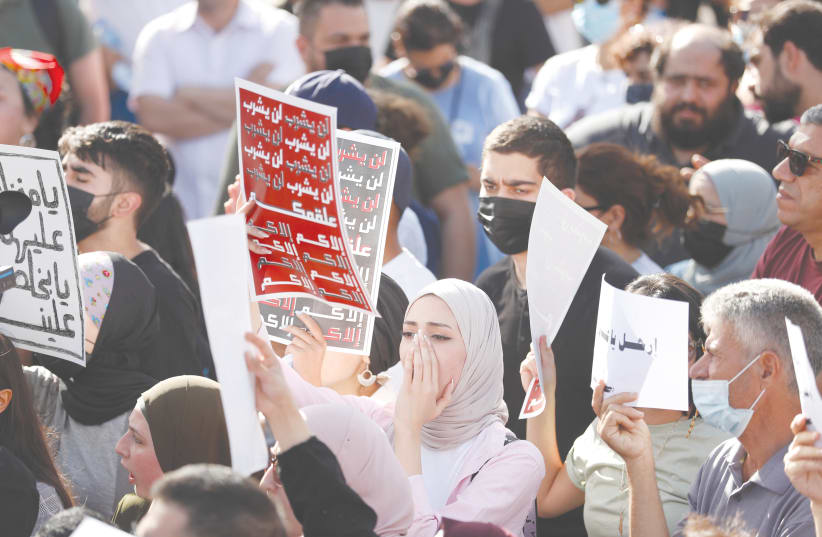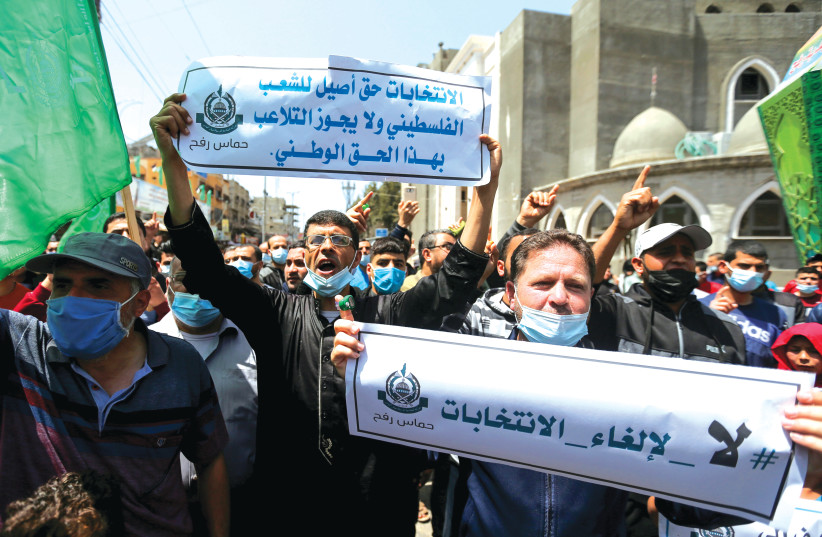The Palestinian Authority and its president have never been less popular among the Palestinian people. Hamas has never been stronger. That is perhaps why there is panic in the corridors of Washington and the capitals of Europe, and to some extent in Jerusalem also, regarding the need to strengthen the Palestinian Authority.
There is no possibility of strengthening the Palestinian Authority without completely reforming it – and there is no doubt that the PA needs to be reformed.
Most Palestinians believe that the PA long ago abandoned its purpose of protecting and advancing Palestinian national rights. The Palestinian Authority’s lack of public support also comes from the overwhelming consensus within Palestinian society that the Authority is corrupt. There is a clear sense of a disappearance of even the appearance of observing human rights and democratic values. And the economy is in shambles.
The PA is also perceived by most Palestinians as being more responsible for the failure of Palestinian unity than Hamas. And in the eyes of most Palestinians, the diplomatic path of the PA has failed as well, leading the Palestinian Authority to be little more than the sub-contractor of Israeli security interests rather than fighting for and advancing Palestinian national interests, as Hamas was perceived to have done in the war in May.
The most important reform that needs to take place is conducting an election – allowing the Palestinian people to choose their own leadership – particularly in light of Mahmoud Abbas now serving the 16th year of a four-year term.
The election should have been held as scheduled in May, and the result was likely to be positive. An election at this time would be a total disaster, and would more than likely lead to a massive Hamas victory.
Strengthening the Palestinian Authority is something that Israel could easily do. The best way is to put the Israeli-Palestinian relationship back on the peacemaking path. That means first freezing all settlement building and returning to direct, genuine and serious negotiations on ending the occupation and reaching peace.
Realistically, it is clear that the Bennett-Lapid government is not capable of doing that, and there is no reason to expect to see the return to a negotiated peace process in the foreseeable future.
The international community could strengthen the Palestinian Authority by recognizing the State of Palestine. They claim to support the two-states solution, yet most of the countries of Europe, for example, recognize only the State of Israel. Recognizing the State of Palestine might actually be one of the only ways left the save the two-states solution. Anyone who continues to advocate for two states should at least recognize the two states. If asked what are the borders of the State of Palestine, the rhetorical answer is: what are the borders of the State of Israel?
Another way to strengthen the Palestinian Authority – for those parts of Palestinian society that still prefer a diplomatic path and not the return to the armed struggle – is for the regional partners to work together to get Israelis and Palestinians back to the table and to invest heavily in the Palestinian economy and Palestinian civil society.
As we mark one year of the Abraham Accords, it is important to remind everyone that the UAE, Bahrain, Sudan and Morocco all declared that they were not abandoning the Palestinian people and their rights. They all spoke about leveraging their new normalized relationships with Israel in order to build more support for the Palestinian people and their national rights.
Egypt and Jordan have been in a formal peace relationship with Israel for decades, and at times have been successful in bringing about ceasefires and mitigating violence and conflicts. But at times, both Jordan and Egypt have felt isolated from the rest of the Arab world, particularly when Israel has been engaged in violence at al-Aqsa, or in the West Bank and Gaza, and when Israel builds more settlements.
Working together, these Arab states do have more leverage, both toward Israel and with the Palestinians. It is time for all of these regional powers to come together, in a full range of activities aimed at renewing Israeli-Palestinian contacts and cooperation, at all levels of society.
I can envisage a kind of steering committee of senior figures from Israel, Palestine, Jordan, Egypt, the UAE, Bahrain, Jordan, Morocco and Sudan. This body would include representatives of government, private sector, civil society, religious community leaders, academics and intellectuals, sports figures, etc. The focus of the body would be to expand regional cooperation across all sectors, but the main emphasis would be in building Israeli-Palestinian cooperation toward renewing the possibilities of peace between the peoples of the core of the conflict.
It would be much easier for Israel to address the Palestinian issue in a regional framework. This process is not meant in any way to legitimize and normalize the occupation. The aim is to put the Palestinian people and Palestinian national rights on an equal footing with the other regional partners.
There could, for example, be possibilities for partnerships between Palestinians and regional players that would increase the local presence of people and institutions from the regional countries, which could serve to reduce significantly Israel’s ability to act with full impunity throughout the West Bank. This is the same idea that I previously presented: that a significant Egyptian presence in Gaza, with its commitment to spend $500 million on the reconstruction of Gaza, would limit the actions of both Hamas and Israel in Gaza, to the benefit of the people there.
Israel, which seeks to be an important regional player, can be enticed to make concessions to the Palestinians, for instance on issues of movement and access, that would ease tensions and create a more positive environment for future negotiations.
Israelis and Palestinians on their own are not going to move back into a process of figuring out how to share this land. But there is an opportunity for regional partners to take the lead and bring Israelis and Palestinians to the table. The regional partners are stakeholders in a more secure and prosperous Middle East. The regional partners also have a much better understanding of the region and the needs and interests of the core parties to the conflict than the United States or Europe. The regional partners can be an integral part of proposing solutions to the core issues in the conflict, and also provide guarantees and mechanisms to advance Palestinian freedom and independence and Israeli security.
The writer is a political and social entrepreneur who has dedicated his life to the State of Israel and to peace between Israel and her neighbors. He is now directing The Holy Land Investment Bond.

